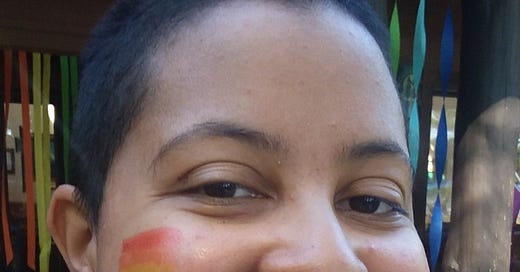My Brown and Queer Faith
“Why are you still a Christian?” That question still catches me by surprise, no matter how many times I am asked.
I am a Brown, Puerto Rican, bisexual/pansexual woman. American Christianity has not been particularly kind to those who are not white, heterosexual males. Moreover, both Evangelical and Mainline denominations continue to grapple with the role of LGBTQ members in the Church with some factions expressing outright hostility towards members of the LBTQ+ community claiming that they are condemned to hell, while other churches/denominations welcome LGBTQ people into their congregations as long as they do not serve as leaders. A few denominations openly accept members of the LGBTQ+ community, at least at the denominational level while varying in practice at the congregational level.
However, because American Christianity is so vast, I have found progressive congregations that openly and unashamedly embrace their LGBTQ+ peers. However, even progressive congregations are not perfect. American Christianity is plagued with racism and progressive congregations do not always recognize the ways in which they contribute to white supremacy. Their racism may not be overt, but it exists.
When congregational leaders refuse to speak about issues such as white supremacy in American society or the concentration camps along the border, because they fear alienating their predominately white congregations, they are letting Black and Brown people know that their concerns are of very little importance. When progressive congregations blame Black and Brown members of their denomination for splits that occur as a result of heated debates regarding whether or not to affirm LGBTQ+ people, they are implying that Black and Brown people are somehow more inherently homophobic and transphobic, ignoring how white Christianity has fueled and supported political parties known for advancing anti-LGBTQ public policies.
As a woman, some segments of Christianity, particularly certain branches of Evangelical/Fundamentalist Christianity believe that women should not hold positions of leadership outside of childcare. However, even Mainline congregations are not immune to sexist attitudes. Women may be allowed to hold various levels of leadership and be ordained, but the pay gap between men and women persists.
So, why am I still a Christian again? I recognize and refuse to make excuses for the ways that Christianity, particularly American Christianity has been used to further marginalize oppressed groups. Yet, as much I try to walk away from God and Christianity, I find myself continually drawn back. I am no longer an Evangelical Christian so I do not believe that atheists, agnostics, or people of different faith traditions are going to hell. In fact, I don’t believe in hell. So, the threat of a vengeful God is not keeping me within the faith.
I am not tied to a particular denomination. I attend the most progressive and welcoming congregation in whatever city/town I happen to be in. Sometimes that is a Disciples of Christ congregation, other times it’s a United Church of Christ congregation, I’ve attended Methodist college groups etc. Denominational loyalty is not why I consider myself a Christian.
I am still a Christian that continues to attend church (albeit virtually because of COVID-19) because even in the midst of the racism, sexism, homophobia, and transphobia, that plagues Christianity, there are also glimpses of what Christianity could be: radically liberating. While there have always been people using Christianity to justify their hatred of poor people, non-Christians, Black and Brown people, and queer people, there have also been others who have insisted that Christianity can be so much more. Christianity can and has been a religion of oppression, but it does not have to be.
Some Christians have found in their faith the motivation to continually fight for justice in the face of violence and oppression. Of course, many people fight against injustice without relying on Christianity or any faith. This is not meant to diminish their hard work nor do I claim that one needs Christianity to advocate for justice. In many ways, because of centuries of baggage, it might be easier to advocate for social justice outside of a Christian framework.
And yet: here I am. Still a Christian. I find myself continually drawn to Scripture not because I believe it’s the inerrant, infallible word of God. I don’t. But because there is something meaningful in all its contradiction. I abhor any attempts to use Scripture to justify the denigration of women, members of the LGBTQ+ community, etc. But I also cherish the stories that talk about a loving God that hears the cries of those suffering. I turn again and again to verses that demand that God’s heart is with the marginalized. And I grapple with verses-sometimes within the same chapter, that seem to present a different understanding of God. The Bible, quite frankly is a mess. Just like me.
I find myself unable to deny the glimpses of grace that I have experienced: flashes of God’s love and presence when I was struggling to survive. I’m not talking about supernatural experiences, but God’s presence through other human beings: Christians and non-Christians.
In spite of myself, I find myself called to advocate and work towards an understanding of Christianity that is much more expansive and inclusive than the forms practiced by many Americans. Maybe that's a fool's errand. But I refuse to let those Christians who believe in an exclusivist, oppressive Christianity have the last word.



